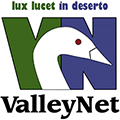East Central Vermont Telecommunications District
Royalton, VT – February 26, 2020 Contact: Irv Thomae, Chair, ECFiber (802) 649-5617
ECFiber Encourages Towns to Join Nascent Communications Districts
Next week, voters at more than 35 Town Meetings across Vermont will decide whether to join
new Communications Union Districts (“CUDs”). As the state’s first CUD, the East Central
Vermont Telecommunications District (“ECFiber”) believes that an update on our status will
encourage other groups of towns to adopt the CUD approach to rural broadband.
What is a CUD?
A CUD is a union district formed to build and operate a communications network serving
residents, businesses, etc. within its member towns. Under the law passed in 2015 (Title 30 Ch.
82), two or more municipalities can form a CUD by townwide vote. It closely resembles other
types of union districts, except that it cannot be financed by local taxes, and does not have
powers of eminent domain. As a municipal entity, however, it can borrow against future
revenues instead of Grand Lists.
ECFiber’s Experience
ECFiber became the state’s first operational CUD in 2016. Since beginning operations in 2011,
ECFiber has covered over 1,000 road-miles of rural neighborhoods with fiber and now has more
than 4,300 customers – over 20 towns will be fully (100%) covered at the end of 2020. It has
raised $42M in revenue bonds and fully covers its interest and principal payments solely with
revenue from its customers. Our experience has proven that CUDs can provide universal fiber
coverage through regional cooperation, combining towns with varying densities and
demographics to create real economies of scale. ECFiber’s 23 member towns have spent a grand
total of $0 to achieve this, and as required by state law**, are not liable for repayment of the
debt (see below).
In addition to universal broadband coverage for its member towns, ECFiber provides 800Mbps
service to over 60 schools, libraries, town halls and other municipal facilities for its lowest rate
of $72/month. Competitive offerings, where available, can cost as much as $2,000/month for
similar service.
State Assistance
In 2019 the state passed legislation recognizing that ECFiber’s model could help other regions in
the state. Act 79 set aside grant funds for groups/towns trying to solve broadband issues (and
created a staff position at the Department of Public Service to assist) and allowed VEDA to loan
up to $4M to startups such as new CUD’s.
30+ Towns Voting – Regional Solutions Needed
Over 35 Vermont towns have put a question on their 2020 town meeting Warning on whether to
join a CUD. In addition to creating scale, CUD membership would allow easier access to state
and federal grants, loans, and other assistance.
Towns Insulated from Districts’ Financial Obligations by State Law**
State law prohibits taxpayers from subsidizing the provision of telecommunications services by
municipalities. If ECFiber or any other CUD were to have trouble repaying its debts, the
bondholders’ only recourse would be to the revenues generated by the district. ECFiber’s outside
counsel, Paul Giuliani, has been instrumental in organizing the legal framework that allowed the
creation of these Districts. He has provided this advice to towns considering joining districts:
“When the CUD enabling legislation was working its way through the General Assembly,
some of the vested interests and their proxies spread the canard that telecommunications
districts would expose their member municipalities to economic liability. Nothing could
be farther from the truth. CUDs are municipal corporations, that is, political subdivisions
of the state of Vermont. Their powers, prerogatives and authority are delegated to them
by legislative action. In both the legislation enabling CUD enactment, as well in as the
general statutes authorizing municipal telecom initiatives,** there are explicit and
unequivocal prohibitions against the use of a member municipality’s taxing power or its
grand list to support a union district’s telecommunications system. Period. Full stop.
Revenue bonding is only paid from, and guaranteed by, the revenues generated from
people using the service, not the Town as a whole.”
The More the Merrier
Vermont would benefit from the formation of new CUDs, because CUDs could cooperate by
sharing management talent, purchasing power (electronics, fiber, Internet backhaul/redundancy,
etc.). More CUDs would also give new fiber operators the chance to cooperate in working with
the utilities to continue to ease “make ready” access to the poles (and if that doesn’t work, to
involve local legislators).
“ECFiber strongly encourages citizens in towns around the state to vote yes and join your
local CUD. We know of no better viable solution to the rural broadband problem” said Irv
Thomae, ECFiber Chair.
** The Vermont Statutes Online
Title 24: Municipal and County Government
Chapter 54: Communications Plant and Service https://legislature.vermont.gov/statutes/chapter/24/054
§ 1913. Communications plant; operation and regulation
(b) A municipality’s operation of any communications plant shall be supported solely by the revenues derived
from the operation of such communications plant, except that portion which is used for its own municipal
purposes.
(c) A municipality may finance any capital improvement related to its operation of such communications plant for
the benefit of the people of the municipality in accordance with the provisions of chapter 53 of Title 24, provided
that revenue-backed bonds shall be paid from net revenues derived from the operation of the communications
plant.
